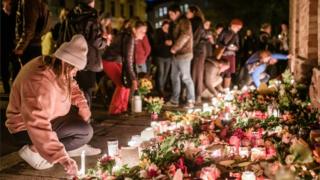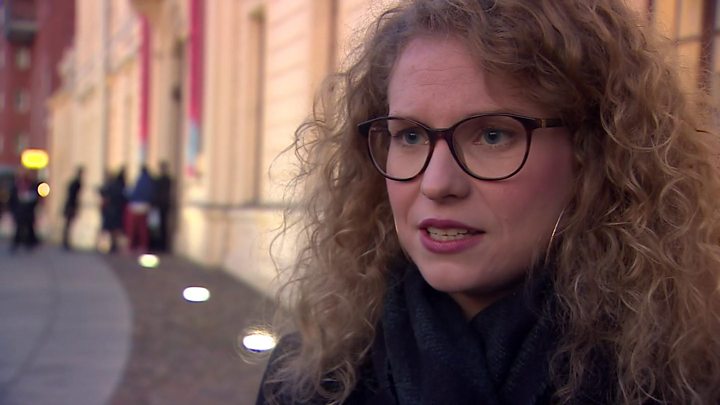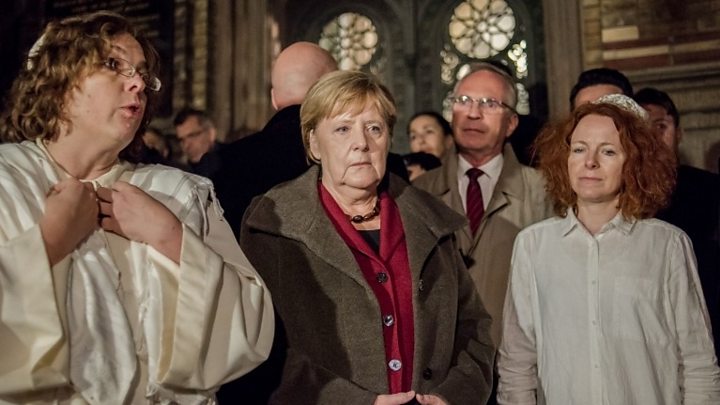 Image copyright EPA
Image copyright EPAThe trial begins on Tuesday of a suspect accused of killing two people after an attack on a synagogue in the German city of Halle last year.
It was the holiest day of the Jewish year.
On 9 October 2019, a cantor at a synagogue in Halle was leading worshippers in prayer to mark Yom Kippur when he glanced at a CCTV monitor and saw a gunman trying to shoot his way into the building.
As officials ushered the congregation into an adjoining room, Christina Feist said she and other worshippers rushed to secure the synagogue.
“I didn’t even understand what was happening, I just knew there was some guy in full battle gear – I didn’t know if he was already on the premises or on the street.
“I saw my friend jumping up and my thought was, ‘You’re not dying alone’, so I jumped up too and ran outside with him and he barricaded one door, I barricaded the other door.”

Media playback is unsupported on your device
The gunman threw explosives into the complex and opened fire on the front door of the synagogue. Recently reinforced, it held firm and likely saved the lives of those inside.
Apparently frustrated by his failure to breach the entrance, he turned his gun on a 40-year-old woman who happened to be walking past, and inflicted fatal wounds on her.
After another unsuccessful attempt to get into the synagogue, he drove off and stopped a few streets away.
There he threw an explosive at a kebab shop and shot dead a 20-year-old man who was inside.
The suspect
Prosecutors believe 28-year-old Stefan Balliet was motivated by anti-Semitism and xenophobia, and planned to massacre those inside the synagogue.
He is believed to have acted alone, having self-radicalised on the internet.
Shortly before the attack, which he live-streamed, he posted documents online in which he called on readers to kill Jewish people. Shortly afterwards, he confessed to the crime during a hearing with an investigating judge.
At the time, his lawyer told German media: “It would be nonsensical to deny it… In his view of the world, he blames others for his own misery and that’s ultimately what triggered his action.”
The response
The attack horrified Germany. The following day, the country’s president Frank-Walter Steinmeier came to pay his respects at a makeshift shrine outside the synagogue door, saying “We must protect Jewish life”.
This country, where the horrors of the Holocaust were perpetrated, vowed “never again”. But despite warnings from the Jewish community, anti-Semitic crime and sentiment are on the increase.
Following Halle, the government passed a law against online hate speech.
Two years ago it also created a new role – a commissioner for the protection of Jewish life.
Felix Klein says there are a number of reasons for the rise in anti-Semitism; chief among them the fact that the internet and social media give an outlet to and are exacerbating what was latent hatred and discrimination.
He aims to combat the problem by strengthening laws and focusing on education but admits there is a long way to go.
“We have a severe problem in Germany where in schoolyards the word ‘Jew’ is very common as an insult,” he said. “There are many fields we have to tackle.
“The main thing is that people should meet Jews and see that Jewish life is a normal, integral part of our culture and that whoever attacks that attacks our own German culture.”
The Jewish community
The synagogue door in Halle is still scarred and splintered from the attempted attack. It is a reminder of the painful details of that day.
Most Jewish places of worship and education in Germany are under constant police guard. The Halle synagogue, even on Yom Kippur, had no such protection. That, for many, has represented a greater failing on the part of the German authorities.

Media playback is unsupported on your device
Rabbi Yehuda Teichtal, who represents the Jewish community in Berlin, has for years warned about increasing levels of anti-Semitism in Germany.
He says that, while the government has made some progress, it is not enough.
- Germany’s elite force ‘partially disbanded’ amid far-right fears
- Has Germany done enough to tackle far-right violence?
“The goal is that people should trust that they should not have to worry when their children go out alone, just because they have a star of David on a chain,” he said.
“There has to be zero tolerance for anti-Semitism. Not just an uproar after an anti-Semitic attack, which eventually dies down.”
The trial
Stephan Balliet is charged with two counts of murder and 68 counts of attempted murder. Some of those who were inside the synagogue that day will be present as he goes on trial.
Christina Feist is among those hoping the court will hear her testimony. The trial is about justice for those killed and injured in the attack but, for her and many, it’s also a chance to emphasise the threat posed by anti-Semitism.
“It gives me a chance to talk about the bigger picture,” she said. “It also gives me the chance to look the guy in the eye, if I can manage that emotionally, to look him in the eye and to kind of prove to him, but especially to me, ‘You’re the one who tried to kill me but I’m still here. You failed – and not only that I’m facing you in court.'”
Click Here to Visit Orignal Source of Article https://www.bbc.co.uk/news/world-europe-53471496


